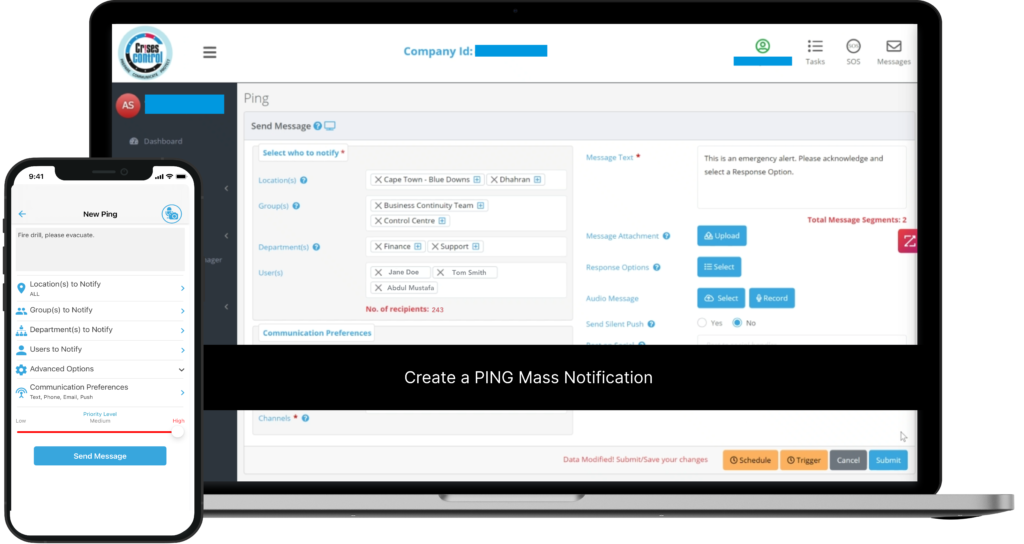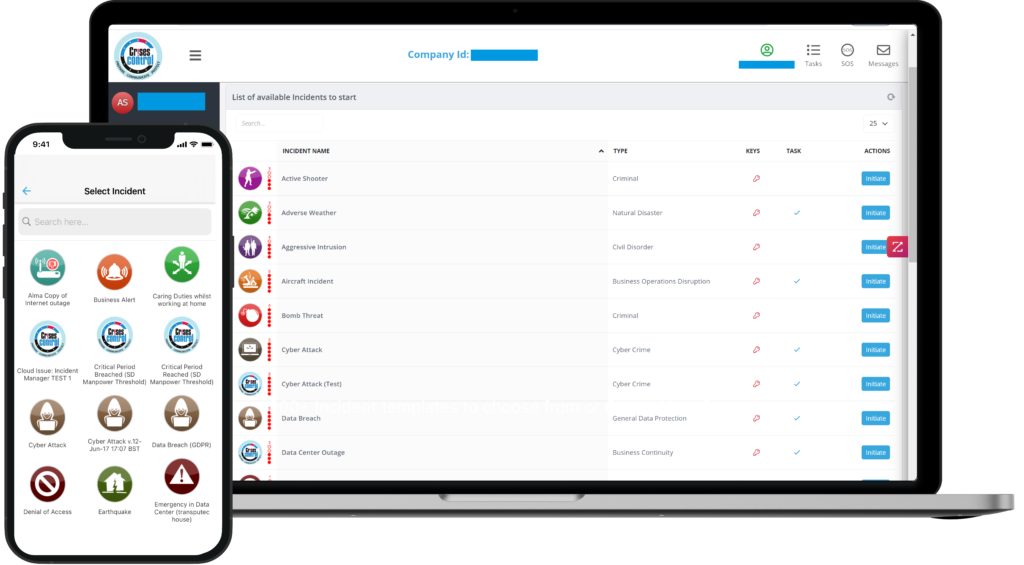Written by Sonny Sehgal | Board Member
In the wake of the recent CrowdStrike outage, which caused significant disruptions for major organisations like Microsoft and Delta Airlines, the importance of robust crisis communication systems has never been clearer. As a company dedicated to providing cutting-edge solutions for crisis management, Crises Control stands as a beacon of reliability and efficiency.
This blog will explore how Crises Control’s crisis communication platform could have mitigated the impact of such an outage and how our tools ensure continuous, effective communication during emergencies.
Understanding the CrowdStrike Outage
On July 18, a faulty update from cybersecurity firm CrowdStrike compromised 8.5 million Windows devices globally, affecting critical infrastructure sectors, including airlines, hospitals, banks, and telecommunications companies. The financial repercussions were immediate and severe, with a 22% plunge in CrowdStrike’s stock value, erasing nearly $16 billion from its market capitalisation.
Organisations like Delta Airlines and Microsoft faced significant backlash for their handling of the situation. Delta struggled with extensive flight cancellations and delays, while Microsoft had to contend with public frustration over the extended disruption. This incident highlighted the vulnerabilities in relying on third-party cybersecurity solutions and underscored the necessity of having a robust crisis communication system in place.
The Importance of Crisis Communication in Managing Outages
During any significant outage or emergency, effective crisis communication is paramount. The CrowdStrike incident demonstrated that timely, accurate, and transparent communication could make a substantial difference in managing the situation and maintaining customer trust. Organisations that failed to communicate effectively faced increased public dissatisfaction and operational challenges.
A crisis communication platform like Crises Control can play a crucial role in such scenarios. By ensuring that all stakeholders are promptly informed and updated, organisations can mitigate the impact of the outage, maintain customer trust, and expedite the recovery process.
How Crises Control’s Crisis Communication Platform Can Help
Real-Time Alerts and Notifications
One of the key features of Crises Control’s crisis communication system is its ability to send real-time alerts and notifications. In the event of an outage like the one caused by CrowdStrike, Crises Control can instantly notify all affected parties through multiple channels, including SMS, email, push notifications, and voice calls. This ensures that everyone is aware of the situation and can take appropriate action.
Comprehensive Crisis Management Tools
Crises Control offers a comprehensive suite of crisis management tools designed to help organisations respond effectively to emergencies. These tools include incident management, task management, and resource management, all integrated into a single platform. During the CrowdStrike outage, these tools could have been used to coordinate the response efforts, track the progress of remediation activities, and allocate resources efficiently.
Secure and Reliable Communication
Crises Control operates on its own cloud infrastructure, ensuring that communication remains secure and reliable even if other systems are compromised. This is particularly important in situations like the CrowdStrike outage, where the reliability of third-party cybersecurity solutions was called into question. With Crises Control, organisations can be confident that their communication channels will remain operational, allowing them to manage the crisis effectively.
Detailed Reporting and Analytics
Effective crisis communication requires more than just real-time alerts; it also involves monitoring and analysing the situation to make informed decisions. Crises Control’s platform provides detailed reporting and analytics, enabling organisations to track the progress of their response efforts, identify areas for improvement, and ensure accountability. In the case of the CrowdStrike outage, these insights could have been invaluable in understanding the scope of the impact and devising a more effective response strategy.
Interested in our Mass Notification Software?
Efficiently alert everyone in seconds at scale with our Mass Notification System – PING, get the message out fast and ensure rapid response and recovery.

Case Study: Managing an Outage with Crises Control
To illustrate how Crises Control’s crisis communication app can be leveraged in such scenarios, consider a hypothetical case study of a major airline affected by the CrowdStrike outage.
Situation Overview
The airline experiences significant flight cancellations and delays due to the compromised systems. Passengers are left stranded, and frustration mounts as communication from the airline is slow and inconsistent.
Crisis Communication Response
- Immediate Alerts: Using Crises Control, the airline sends immediate alerts to all passengers, informing them of the situation and providing updates on the expected resolution time.
- Coordinated Response: The airline’s crisis management team uses Crises Control’s task management tools to coordinate response efforts, ensuring that all relevant departments are working together to resolve the issue.
- Transparent Communication: The airline maintains transparent communication with passengers, providing regular updates through multiple channels. This helps to alleviate frustration and maintain customer trust.
- Post-Crisis Analysis: After the situation is resolved, the airline uses Crises Control’s reporting and analytics tools to review the response efforts, identify areas for improvement, and implement changes to prevent similar issues in the future.
The Benefits of Using Crises Control in Crisis Communication
Implementing Crises Control’s crisis communication platform provides several benefits for organisations, particularly in managing outages and emergencies:
Enhanced Communication Efficiency
By centralising all communication channels into a single platform, Crises Control ensures that information is disseminated quickly and efficiently. This reduces the risk of miscommunication and ensures that all stakeholders are on the same page.
Improved Response Coordination
Crises Control’s comprehensive suite of crisis management tools enables organisations to coordinate their response efforts more effectively. This ensures that resources are allocated efficiently and that all relevant departments are working together towards a common goal.
Increased Customer Trust
Transparent and timely communication is crucial in maintaining customer trust during a crisis. By providing regular updates and addressing concerns promptly, organisations can alleviate frustration and maintain a positive relationship with their customers.
Continuous Improvement
The detailed reporting and analytics provided by Crises Control enable organisations to review their response efforts and identify areas for improvement. This continuous feedback loop helps to ensure that organisations are always prepared for future crises and can respond more effectively.

Interested in our Incident Management Software?
Customise your Crisis Incident Management Software to meet your specific needs with our flexible tools & stay connected and informed during the crisis and incident management process
Conclusion: Ensuring Effective Crisis Communication with Crises Control
The CrowdStrike outage serves as a stark reminder of the importance of effective crisis communication. With the right tools and strategies, organisations can mitigate the impact of such incidents, maintain customer trust, and expedite the recovery process.
Crises Control’s crisis communication platform offers a comprehensive solution for managing emergencies, ensuring that organisations are always prepared and equipped to respond effectively. From real-time alerts and coordinated response efforts to secure communication and detailed analytics, Crises Control provides everything needed to navigate crises successfully.
Don’t wait for the next crisis to strike. Ensure your organisation is prepared by investing in a reliable crisis communication system. Contact us today to get a free personalised demo of Crises Control and see how our platform can help you manage emergencies effectively.
Request a FREE Demo

